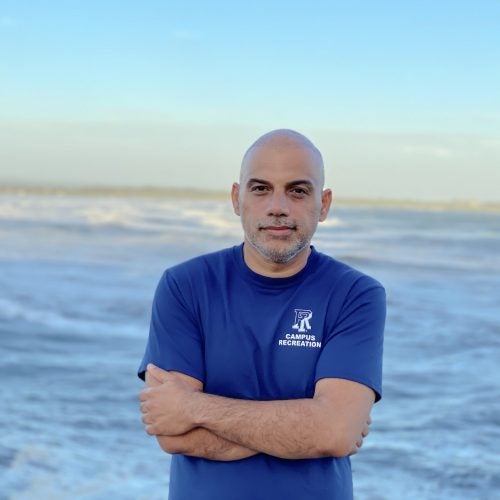Reza Hashemi is both a researcher and a teacher, helping guide students in their career choices as he shares with them his expertise in ocean engineering and physical oceanography. Drawn to ocean renewable energy and coastal resilience issues, in the context of ocean engineering, Hashemi provides his perspective here about the advances in this rapidly changing field.
For Reza Hashemi, associate professor in the Department of Ocean Engineering and the Graduate School of Oceanography at the University of Rhode Island, the worldwide effort to look to the marine environment for clean energy resources is significantly shaping ocean engineering today. The field is an exciting one, says Hashemi, and has a very human focus. “Ocean renewable energy presents us with important issues in multiple disciplines, because, as we have seen with the Block Island Wind Farm, we should investigate the technical and engineering aspects, impacts of energy devices on the marine environment such as birds and marine mammals, and the effect it may have on people, on their livelihoods such as the fishing industry.”
Ocean engineering is a broad discipline which studies how humans are able to operate in the marine environments and harness their resources in a sustainable way which ensures preserving the health of the ocean ecosystem. Ocean renewable energy represents an increasingly active arena within the engineering realm. “It’s become quite multidisciplinary moving toward an interdisciplinary field,” says Hashemi, “and engineering has a major role in answering the issues posed by ocean renewable energy.”
What that means is that the effort to understand both the opportunities and challenges of offshore renewable energy is progressing, within academia, as a shared partnership across different areas of expertise – even within the engineering concentrations themselves. “Beyond ocean engineering, we are seeing civil, environmental, mechanical, electrical, and chemical engineering, we are looking at these issues together,” he says. “Collaboration is very important, and it is necessary to more fully address issues of alternative energy.” For instance, civil engineers are interested in the foundation and substructure of a wind turbine, mechanical engineers in the design of turbine blades, electrical engineers focus on control and power generation, and ocean engineers are necessary to design and operate any structure in the ocean environment.
His own engineering/oceanographic studies in the United Kingdom permitted him ample interaction with tidal and wave energy research and development projects, and he continues now at URI to take part in studies that will provide coastal communities with data to inform their choices about ocean renewable energy resources including offshore wind farms. One collaborative effort, for instance, is gathering data and using computer models to inform regional dialogue about the potential installation of tidal turbines in the Gulf of Maine. “This study is about characterizing the tidal energy resources of the Gulf which has an extreme tidal range,” says Hashemi. “We want to think about how much energy or resource could be produced from tidal currents, and also how might this energy production impact the ocean environment – how the physics of the system responds to this extraction of the resource.”
He’s also very interested in how offshore renewable energy facilities including wind farms could be impacted by strong storms, including hurricanes. With so many proposed wind farms along the eastern seaboard, it will be important to learn how well the structures withstand extreme weather and identify resiliency and protective measures.
Through teaching and writing – he recently authored a textbook for college-level ocean renewable energy education1 – Hashemi engages with stakeholders and students, and for students especially, he has some particular advice: “There are many resources available to you, if you want to pursue this as either an undergraduate or a graduate student,” he says. “I encourage you to look into these resources, and to reach out if you need more information. There is a great deal going on.”
View Expert Profile
Press
First textbook in marine renewable energy explores harnessing ocean power — URI Communications
[1] Neill, S. P., & Hashemi, M. R. (2018). Fundamentals of ocean renewable energy: generating electricity from the sea. Academic Press. ISBN 978-0-12-810448-4

